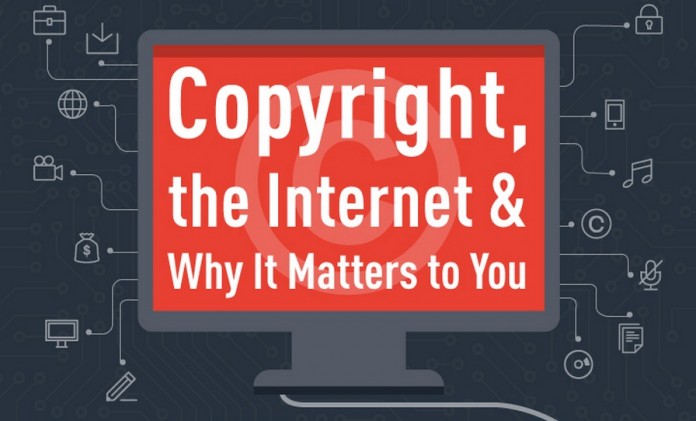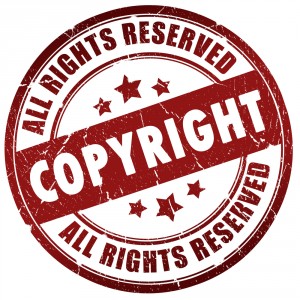In this blog post, Sakshi Samtani, a student of K.C. Law College, Mumbai, who is currently pursuing a Diploma in Entrepreneurship Administration and Business Laws from NUJS, Kolkata, talks about copyright infringement through the internet.
Copyright is gaining utmost importance globally. America earned 89 billion dollars from the copyright industries which consisted mainly of the Movie and Music industries. It is of extreme importance that this lucrative commodity gets the protection it deserves. With regards to sharing of files, infringement of copyright occurs mainly because of the disability of the music and movie industry.
Intellectual property is inclusive of innovations, inventions, scientific discoveries, industrial designs, trademarks, logos, business processes, literary and artistic works and knowledge which are all results of the creator’s intellectual application. Several elements of intellectual property can be protected under Copyright Laws. The product shape can be protected as industrial design, the brand name inscribed is protected as a trademark, and the internal parts of the products can be protected as a patent, as is the case with billionaire company Apple which patented their Apple Computers.
The copyright law enacted as The Indian Copyright Act, 1957 grants protection to five bodies of works which include literary works (e.g., Brochures, Manuals, Blog Posts, Articles, Website content and any other material used for marketing, software, databases etc), Artistic works (Paintings, Drawings, and Photographs), music work, sound recordings, cinematograph movies, works of drama such as dance choreography, skits, drama and so on.
Section 51 (a)(ii) of the Copyright Act states that “the act of infringement is when, a person without any licence by the registrar or the owner of the particular copyright, does an act that is in the contravention of the conditions of licence or condition imposed by a competent authority under this Act permits for profit any place to be used for the communication of the work to the public where such communication constitutes an infringement of the copyright in the work, unless he is unaware as and had no reason to believe that the particular communication to the general public would result in copyright infringement.”
These days, Internet service providers give instructions to their servers to transmit and store the data of users across the network. This move helps the ISPs to have grounds to pin liability on any third party if any infringement has taken place. To be liable for a copyright infringement, it is important to show that the ISP benefitted financially from it in some way. ISPs earn a high amount even when they showcase some illegal material that has been copyrighted because of the advertisements that were part and parcel of the material shown. So, an ISP is only held liable when they transmit the illegal material and also when they store it.
IP Rights are usually granted by law to create a sustainable system which gives rise to innovation by handing over certain rights which are exclusive to the creature of the innovation. This is also a catalyst for the creation of more intellectual property that would finally benefit the economy. Protection of intellectual property aids in maintaining a balance between the interest of the public and the needs of creators or innovators.
Liability of copyright is placed on three concepts which are direct, vicarious and contributory infringement. Direct infringement happens when a person violates any right that is exclusive to the owner of the copyright. Vicarious liability occurs when a person does not prevent infringement when he should and as a right must do so, and he benefits from the infringement taking place. Strict liability is the basis of these two concepts, and a person will be held liable regardless of his intent and state of mind. The third concept Contributory liability happens when a one takes part in the act of direct infringement and knows of such illegal activity. A question that always arises is ‘what is the standard to be held to fix the service provider’s responsibility?’
An internet service provider (ISP) is criminally liable when he commits an act of infringement or when he abets another in infringement of copyright in a body of work, or any other right which is covered in the ambit of the Act. The commitment of such an act leads to the punishment which is imprisonment which can extend up to a year, or a fine or in some scenarios both are applicable. The Act states that liability can be removed on the ISP’s if it can be proved that they were unaware that copyrighted material was being held in storage or transmitted via their servers. This is the only exception to such liability.
In India,the liability of the service providers has not been expressly covered by the Indian Copyright Act. If the service provider can prove that he did not know of the occurrence of the alleged act and that he had taken steps to prevent this, the Information Technology Act, 2000 prevents them from being held liable. However, the provision must be tightened and prescribe liability limits on the service providers.
The Information Technology Act must address the financing of such transactions and the link between the ISP and a third party because this is important to establish the identity of the person who is violating the law. Contributory infringement which is an American concept could also be enacted into the Indian Act so that any third person having knowledge or indirectly participating in the infringement can also be held liable. In India, as long as the service provider shows that they have conducted reasonable due diligence, then they are in the clear. However, the Act does not clearly define due diligence so conducting such diligence could be a disastrous idea as it can lead to a lack of privacy and policing. There is a demand to have a better system in place and clarify the meaning of the words “due diligence” because the main function of the ISPs is to build the internet and not police it.
There are certain remedies if an infringement has taken place. Take down notices if the infringement has taken place online, businesses have the option of writing to an ‘intermediary’ putting a request to remove the content. On receiving the request, the intermediary has 36 hours to take it down from the servers. The main remedies for copyright infringement are having an injunction taken out against the circulation of the infringed material, and monetary damages or an account of the profits which were made through the sale of infringing copies. However, if the infringer can prove that on reasonable grounds he had no knowledge that such work was copyrighted, then the only effective remedy that can be put in place is taking out an injunction against the erring person. He will not be held liable to pay damages or show an account of profits.
To prevent the infringing party from arguing that he was not aware such material was copyrighted, the owner of such material must show a claim to the copyright on his work by attaching a copyright notice.
A standard copyright notice would include the copyright sign © along with the name of the entity/individual, and the year of creation of the work, followed by the words “All rights reserved. Any authorized distribution, circulation or republication of a part of the whole of the book or pamphlet or any other will be liable to action under the applicable law”.
When awaiting the final decision on the proceedings of a legal case, a temporary injunction can be taken out. They can also be granted in the absence of the offender (ex parte). A couple of relevant injunctions are the John Doe orders and the Anton Pillar orders. A John Doe order is an injunction which gets passed against unspecified offenders. This is incredibly useful when it is difficult to identify the offender quickly or when the violation is happening at multiple locations at the same time. This order is binding once it has been issued. A good example of the John Doe order is the case of the movie Singham. (Reliance Big Entertainment v. Multivision Network and Ors.) (Del HC)
Anton Pillar orders give the owner the authority to enter the premises of the infringer to inspect documents and articles or to remove such documents and articles from the custody. The purpose of this order is the prevent the offender from destroying the copyrighted evidence. This is why this order also known as an ex-parte order is issued without even hearing the offending party’s case. These orders are highly useful in software piracy cases.
Recently, Kickass Torrents, a very popular torrent site has been taken down. The American government arrested the founder of the website, a Ukrainian named Artem Vaulin. He was charged with criminal copyright infringement. However, in India, the piracy industry is still very much intact. Because of piracy, the film industry in India loses a ton of money, something to the tune of Rs. 18,000/- crores and about 60,000 people lose their jobs every year!
 Serato DJ Crack 2025Serato DJ PRO Crack
Serato DJ Crack 2025Serato DJ PRO Crack













 Allow notifications
Allow notifications


